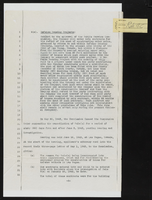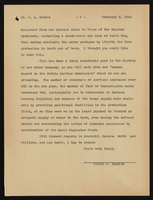Search the Special Collections and Archives Portal
Search Results

Mario Sandoval interview, December 6, 2018: transcript
Date
Archival Collection
Description
Interviewed by Claytee White. Mario and his six siblings were reared by a single mother who taught him all of the family recipes. Moving to Las Vegas at four years of age Mario remembers moving into a black neighborhood where the family was not welcomed. All windows in their home were broken into the first night. The family moved the next day. Though the new house was still in an African American neighborhood, they were protected by Vera, their black babysitter. Mario developed the intense work ethic of his mother, and after working in several strip casinos, found his home at the Horseshoe, today's Binion's. He has been there for 33 years; first as a busboy and then becoming a waiter. He is a Culinary Union trained shop student who picketed his beloved work place for ten months during a 1980's labor dispute. His work in life and union benefits have made his a very good life.
Text
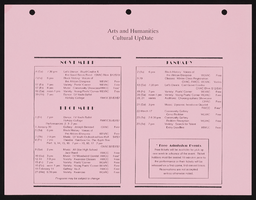
Alpha Kappa Alpha Sorority, Theta Theta Omega Chapter arts and humanities committee reports
Date
Archival Collection
Description
From the Alpha Kappa Alpha Sorority, Incorporated, Theta Theta Omega Chapter Records (MS-01014) -- Chapter records file.
Text
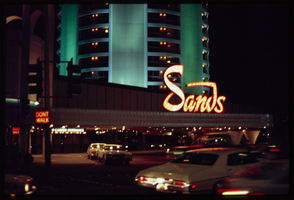
Exterior view of Sands Hotel and Casino in Las Vegas, Nevada: photographic slide
Date
Archival Collection
Description
Image
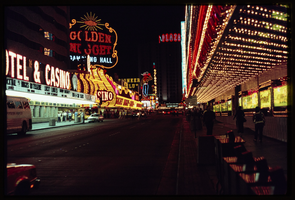
Exterior view of Golden Nugget Casino in Las Vegas, Nevada: photographic slide
Date
Archival Collection
Description
Image
Audio clip of an interview with Ian and Shanna Anderson by Barbara Tabach on October 11, 2013
Date
Archival Collection
Description
Sound

Street map of the Las Vegas area, circa 1960
Date
Description
Image

Las Vegas African American Community Conversations, Part 2: Education, Economy and Integration: video
Date
Archival Collection
Description
The Las Vegas African American Community Conversations is a four part, one hour round table conversation with local Las Vegans. They share their powerful stories and great history, with topics ranging from “Migration, Civil Rights, Education, Church, Entertainment and the Early Legal Community”. Part Two: A conversation about “Education, Economy and Integration” MODERATOR- Sonya Horsford Ed.D. PANELISTS- Dr. Esther Langston (Professor UNLV) Verlia Davis-Hoggard (Director of Clark County Social Services-Retired) Idan M. Gaines (Regional Representative for Senator Harry Reid) Dr. Linda Young (President-CCSD Board of Trustees)
Moving Image


